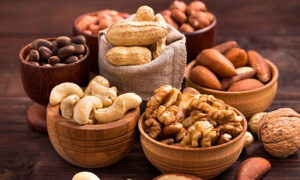Cottage cheese is a creamy, soft white cheese made from pasteurized milk curds. It is relatively low in calories but rich in protein, B vitamins, and other healthy nutrients, providing many health benefits. Additionally, cottage cheese is low in sodium and lactose-free, making it a good addition to many diets.
Here’s everything you need to know about cottage cheese, including its nutritional value, benefits, risks, and how to include it in your diet.
1. May Support Muscle Growth
Cottage cheese has long been popular among athletes and gym-goers thanks to its cost-effectiveness, ease of use, and high protein content.
When combined with strength training, the protein has been shown to be beneficial for muscle growth. It provides the amino acids needed to rebuild and repair muscle tissue.
The protein in cottage cheese comes primarily from casein, a slow-digesting protein.
Research has shown that consuming casein before bed, especially after strength training at night, may aid muscle recovery. Researchers believe this is due to its ability to increase amino acid availability during sleep, prevent muscle protein breakdown, and reduce exercise-induced muscle damage.
Additionally, there is also evidence that dairy products may help prevent muscle breakdown and maintain muscle health in older adults.
2. It May Help You Lose Weight
Cottage cheese is a low-calorie, high-protein food that can help you lose weight.
A high-protein diet can lead to weight loss and the prevention of obesity and related diseases.
This is in part because protein is more satiating and has a higher thermic effect than carbohydrates and fats, meaning your body burns more calories through digestion.
A 2016 study found that increasing your dairy intake in combination with a reduced-calorie diet could lead to significant weight and fat loss without losing muscle. These effects are due to its protein and calcium content.
Some studies have suggested that calcium may be involved in weight loss, possibly by decreasing fat production and increasing the breakdown of existing fat in the body. Calcium may also increase the excretion of fat in the stool.
3. Promotes Bone Health
Cottage cheese contains moderate amounts of calcium, a mineral the body needs to maintain strong bones. Inadequate dietary calcium intake can lead to osteoporosis, a condition in which bones become weak, fragile bonesand increase the risk of fractures.
Cottage cheese is also a good source of phosphorus, which plays an important role in bone health. Although very rare in the United States, inadequate phosphorus intake can lead to bone pain, muscle weakness, and osteomalacia (a condition in which bones become soft and weak).
Additionally, the protein in cottage cheese may help prevent bone loss and reduce the risk of fractures in older adults.
Nutritional Information
The nutritional content of cottage cheese varies depending on the type of milk it is made from. One half cup of low-fat cottage cheese (1-2% milk fat) contains the following nutrients:
- Calories: 93
- Protein: 12.4 grams (g)
- Fat: 2.6 g
- Carbs: 4.9 g
- Selenium: 30% of the Daily Value (DV)
- Riboflavin: 20% of the DV
- Vitamin B12: 20% of the DV
- Sodium: 16% of the DV
- Phosphorus: 13% of the DV
- Calcium: 9% of the DV
Cottage cheese is considered a complete dairy source of high-quality protein because it contains all nine essential amino acids that the body cannot produce.
Cottage cheese is an excellent source of selenium, a mineral that helps your body produce its own proteins called antioxidant enzymes. These enzymes help protect cells from damage caused by free radicals (unstable molecules). Some studies suggest that selenium may help prevent certain cancers and protect the body from the toxic effects of heavy metals.
It is also a good source of riboflavin and vitamin B12, which help the body produce energy from food.
Vitamin B12 in particular is important for nerve and blood cell health and protects against vitamin B12 deficiency anemia, which can cause fatigue and weakness.
Cottage cheese contains a relatively high amount of sodium, so you should choose a reduced-sodium version, especially if your doctor has prescribed a low-sodium diet.
Risks
Cottage cheese is generally safe for most healthy people, but it may cause side effects in some people.
Lactose Intolerance
Because cottage cheese is a fresh cheese, it contains more lactose than mature hard cheeses. This can cause symptoms such as bloating, diarrhea, nausea and abdominal pain in people who are lactose intolerance.
However, cottage cheese contains less lactose than milk: 0.7 to 4 grams of lactose per half-cup serving.
Some studies suggest that people with lactose intolerance can safely tolerate up to 12 grams of lactose at one time, or 18 grams over the course of a day.
Therefore, some people with this condition can still tolerate moderate amounts of cottage cheese.
Dairy Allergy
If you are allergic to cow’s milk, you should avoid cottage cheese because it is made from milk.
If a person with a milk allergy consumes cottage cheese, they may experience hives, stomach upset, vomiting or even anaphylaxis, a life-threatening condition that causes breathing problems.
Tips for Eating Cottage Cheese
Cottage cheese has a soft, creamy consistency that is easy to add to both sweet and savory dishes. Here are some ways to add cottage cheese to your diet:
- Serve it with fruit: Pair cottage cheese with peach slices, berries, apples, tangerine oranges or pineapple chunks.
- Add to salads: Add cottage cheese to a mix of crisp vegetables, tomatoes and dried fruit.
- Savory dishes: Incorporate cottage cheese into lasagna, stuffed shells, quiche, and meatloaf recipes.
- Baked goods: Add cottage cheese to muffins, cakes, cookies or bread.
- Toast: Top toast with cottage cheese, avocado and a tomato slice for a high-protein snack or breakfast.
- Scrambled Eggs: Add cottage cheese to increase the protein content and fluffiness of the scrambled eggs.
- Dips: Replace cottage cheese with sour cream or milk in a variety of dips and vegetable sauces.
Overview
Cottage cheese is a nutritious food that is relatively low in calories but high in protein, selenium, some B vitamins and phosphorus.
The nutrients found in cottage cheese may contribute to weight loss, muscle growth and bone health. However, due to the high sodium content, people watching their salt intake should opt for low-sodium varieties.
- March Madness 2025: Printable Bracket, Game Schedule & How to Watch - March 13, 2025
- March Madness Miracles: Worst Records to Get an NCAA Tournament Bid - March 13, 2025
- NCAA DI Wrestling Championships 2025: How to Watch, Brackets & Selection Info - March 13, 2025





